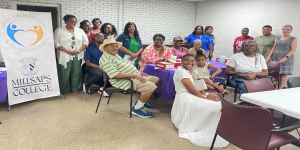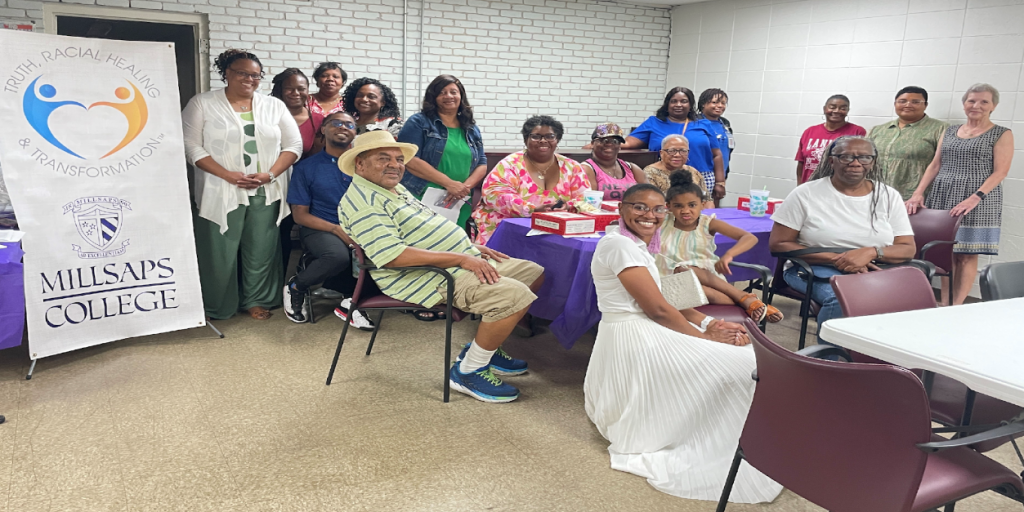
This summer, one of the Foundation’s partners, Mission Mississippi brought together locals from all walks of life for open, honest dialogue about the drivers and solutions to racial divisions.
Communities across the Mississippi gathered to talk about how the role of race plays in local economies, how churches advocate for or against racial issues, and how they might work toward racial healing and change.
“People are really passionate about wanting to be unified, but they don’t exactly know how to get there,” shared Brian Crawford, President of Mission Mississippi. “One thing I get to affirm daily is how much people genuinely want this.”
Mission Mississippi, established in 1993, is a statewide ecumenical organization dedicated to building relationships between individual Christians and congregations across racial and denominational lines. For over 30 years,
Mission Mississippi hosted One Community Conversations in Picayune, Hattiesburg, and Biloxi, with dozens of people joining in. But getting people into the room wasn’t as simple as sending flyers or an email invite.
“Getting folks to show up for these conversations can be tricky because so many have had poor experiences with these kinds of talks,” Brian explained. “We had to be very intentional about how we approached it.”
To do this, Mission Mississippi partnered with groups like the Mississippi Gulf Coast Chamber of Commerce, United Way of South Mississippi, Hattiesburg High School, and others.
“We worked with each organization because of their reach, relationships, and relevance to Mississippi’s TRHT focus on economics,” said Dr. Felicia Bowens, Executive Assistant to the President.
Before the main event, Mission Mississippi held prep meetings to set the tone. In these sessions, they shared guidelines that emphasized respect, empathy, and openness. These guidelines encouraged participants to engage honestly and to view the conversation as a space for learning and mutual understanding.
Creating this foundation was essential for ensuring that people felt supported and valued, no matter their background or experience level in discussing race.
“We have to let people be authentic, and we have to let them fumble through it,” Brian said. “That’s how we fully understand the climate and issues around race.”
Storytelling serves as a powerful bridge, enabling participants to see each other not as representatives of a group but as individuals with unique experiences. This approach aligns with the larger goals of the TRHT initiative, which aims to build racial healing through personal and collective narratives that highlight both shared humanity and differences
Felicia from Mission Mississippi recounted a moment in Picayune where one white woman broke out in tears when another black participant shared that they think about how their race shapes how people perceive them daily. In Biloxi, another white participant shared how a discussion on the changes in TSA protocols after 9/11 helped him realize the importance of historical context in understanding current issues.
One of the most significant takeaways from the One Community Series was the realization that each community’s needs are unique. Racial healing efforts cannot be one-size-fits-all; they must be adapted to reflect local history, issues, and dynamics.
One Community Conversations revealed distinct concerns across Mississippi’s communities. For example, in Jackson, issues around environmental racism and infrastructure emerged due to the city’s water crisis, while in Hattiesburg, discussions focused on economic development and employment equity.
A key to Mission Mississippi’s success was anchoring the conversations in issues directly impacting the local community. By focusing on how racism affects Mississippi’s economy, education, and daily interactions, they helped participants see the practical importance of these discussions.
“It’s not just about sharing spaces like we often see in politics,” Crawford explained. “We have to share our stories, struggles, and success. Until we do that, our journey toward unity continues.”
One Community conversations are part of a greater Mississippi TRHT initiative led by the Foundation for the Mid South in partnership with six local organizations, including Mission Mississippi, Millsaps College, Jackson State University, Tougaloo College, the Neshoba Youth Coalition and The Alluvial Collective. These organizations will continue convening communities to promote racial healing.


